CCG Holds the 2016 Annual China and Globalization Forum in Beijing
January 19 , 2021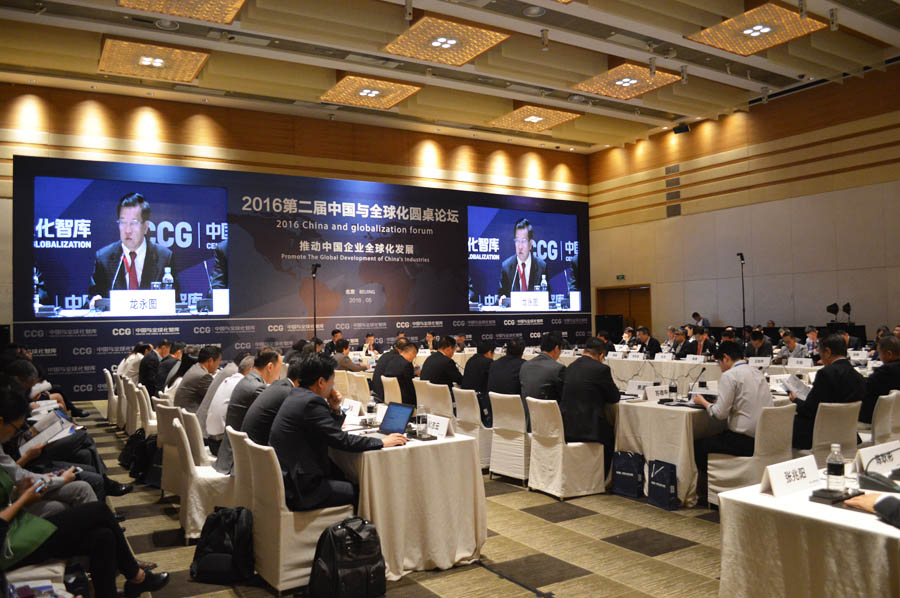
CCG held its 2nd Annual China and Globalization Forum at the Beijing Hyatt Hotel on May 15, 2016. Focusing on the challenges and opportunities China is encountering during its globalization process, the guest speakers and panelists delivered in-depth analysis and shared their insights with the forum attendees and mainstream media agencies. Before the forum, a private session was held exclusively for CCG council members. Long Yongtu, the Chairman of CCG Strategic Advisory Board, Ronnie C. Chan, the Co-Chairman of CCG Strategic Advisory Board, Cao Dewang, the Vice Chairman of CCG, Fang Fang, Liu Yonghao, Wang Shi, Wang Guangfa, Wang Huiyao, Xu Xiaoping, and dozens of other CCG council members attended the private session.
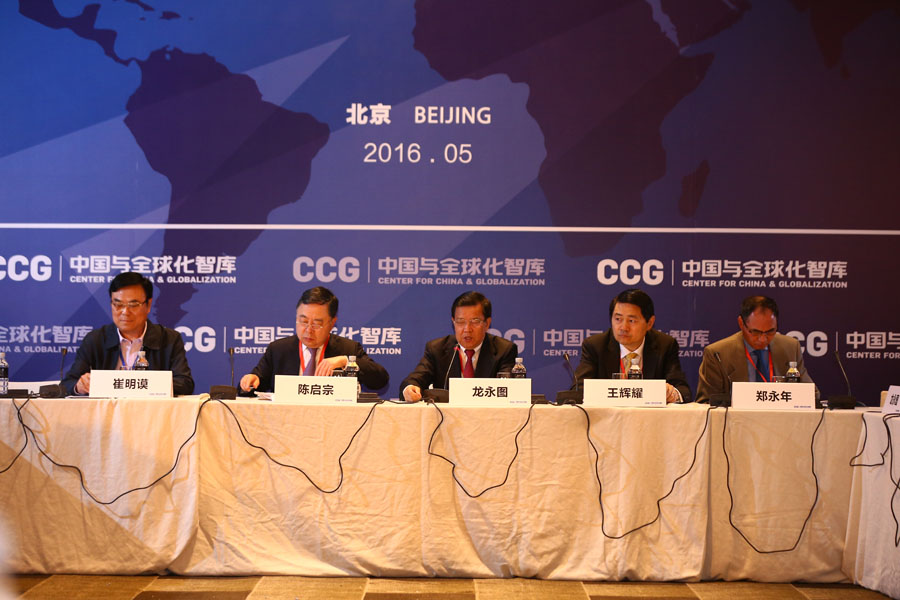
Wang Huiyao, President of CCG, Counselor of the State Council and the Vice Chairman of China Western Returned Scholars Association, moderated the opening ceremony of the forum. Four CCG leaders attended the ceremony and made keynote speeches to the forum. These individuals were Yongtu, the Chairman of CCG and the Former Vice Minister of the Ministry of Foreign Trade and Economic Cooperation; Ronnie C. Chan, the Co-Chairman of CCG Strategic Advisory Board, the Chairman of Hang Lung Group, and the Vice Chairman of the Board of the Asia Society; Cui Mingmo, the Chairman of China Association for International Economic Cooperation; and Zheng Yongnian, the Director of CCG Academic Advisory Committee and Director of East Asian Institute of National University of Singapore.
Building a Prestigious and Internationally Leading Brand in Think Tank Forums

In 2015, CCG successfully held its 1st Annual China and Globalization Forum. The event was one of the very few such forums put on by a Chinese think tank. It brought together government officials, business executives and academic scholars to engage in fruitful dialogue about China and globalization. With such an insightful discussion, the forum had a far-reaching impact, encouraging CCG to continue its effort in building a prestigious and internationally leading brand in think tank forums.
This year, China’s Report on the Work of the Government put forward for the first time the idea of using international cooperation to fight the increasingly worse problem of worldwide surplus production capacity. In 2016, China’s economy faced growing challenges stemming from its slowing growth rate and industrial restructuring. Facing this difficult period, enterprises need to undertake reforms, including stepping up innovation, structural upgrading, and global market expansion, to cope with the changing environment. With the signing of several national key projects in Europe, South America, Asia and Africa, Chinese enterprises are accelerating their pace of going global. Against this backdrop, global governance, “the One Belt/ One Road” initiatives, regional free trade zones, enterprise innovation, and building global talent have also become the crucial topics for today’s economy. New technologies such as artificial intelligence and cloud platform computing will definitely trigger a crucial industrial revolution in the near future. Under such circumstances, China’s economy is facing numerous unanswered questions. These include the following. How can it transform the traditional industrial economy into intelligently Made in China? How to enhance China’s advantages in international trade and talent acquisition? How to obtain a diverse innovation model and attract new investment? How much will globalization and technology advancement influence the industrial structures of the traditional enterprises? All of these questions deserve in-depth discussions.
The 2nd Annual China and Globalization Forum continued the discussion surrounding the challenges and opportunities China faces during its globalization process. The specific topics included G20 and Global Governance and the Development of China; the New Opportunities in the Global Development of Chinese Enterprises; Establishing an Internationally Competitive Talent Attraction System; and the Future of Internet Plus and Sharing Economy 2.0. As one of the most important and prestigious forums held by a Chinese think tank, the gathering and its discussion provided vivid cases with strong theoretical underpinning on the topic of China’s global development. In so doing, it advocated the reform of China’s policies and delivered sound advice to its government for doing so.
Nearly a hundred of government officials, business executives and academic scholars, including Long Yongtu, Ronnie C. Chan, Wu Jianmin, Wang Huiyao, Cui Mingmo, Zheng Yongnian, Chi Fulin, Wu Shuqing, Liu Yonghao, Tang Xiuguo, Xu Xiaoping, Wang Guangfa, Chen Shuang, Dai Zhikang, Fang Fang, Gao Hongbing, Guo Sheng, Liu Wenbo, Ma Jun, Qin Hongtao, Ruan Xiaoming, Wang Xiaochuan, Wei Jianing, Xia Hua, Zhang Yansheng, attended the forum and delivered impressive speeches.
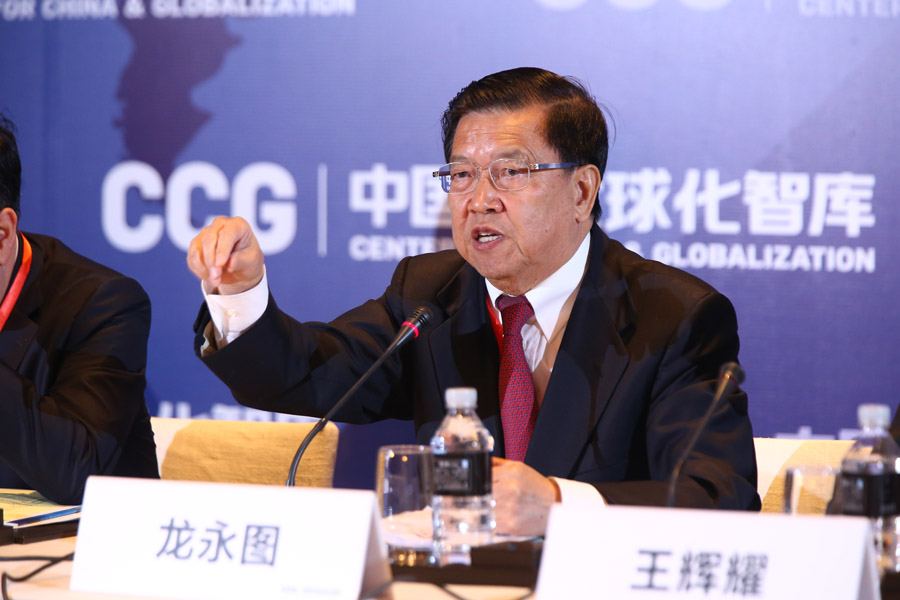
Long Yongtu reemphasized in the opening ceremony that only with continuous globalization, can Chins’ opening up be situated in a larger stage. As a globalized think tank, CCG’s primary task is to promote globalization on an international-level, assisting Chinese enterprises in their globalization and advocating a better policy for acquiring global talent. With this goal in mind, CCG’s astonishing effort in organizing the forum on the topic of promoting Chinese enterprises’ global development has provided practical value and made a crucial impact in the advocacy of policy reforms.
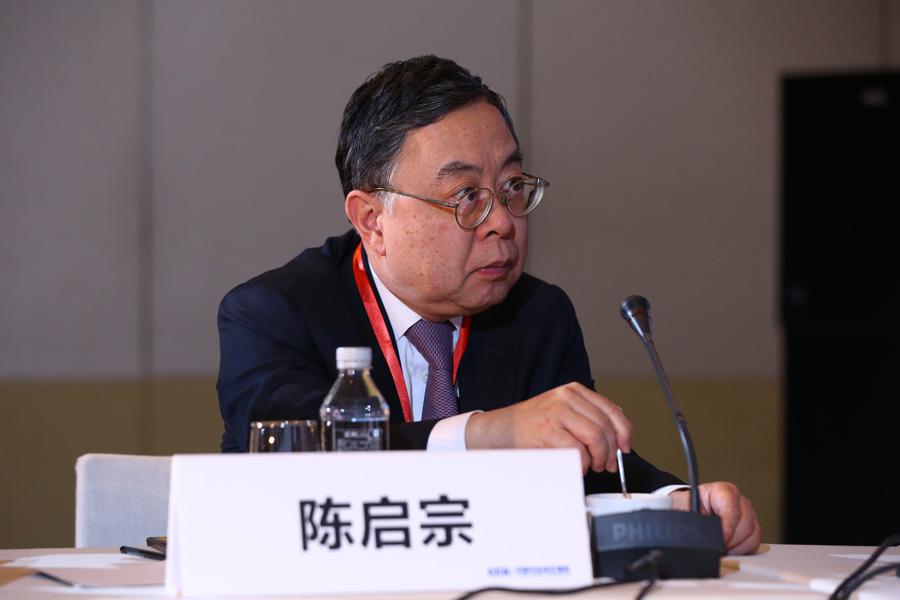
Ronnie C. Chan argued that globalization is irreversible and the One Belt/One Road initiatives can be considered as the last phase for completing the entire globalization process. Taking a world historical and geo-economic perspective, think tanks shall do research on how China cope with the fast-changing global economic environment. Chan hoped that the public can obtain a clearer understanding about their positioning in the globalization process through this forum discussion and contribute to China’s sustainable economic development and globalization.
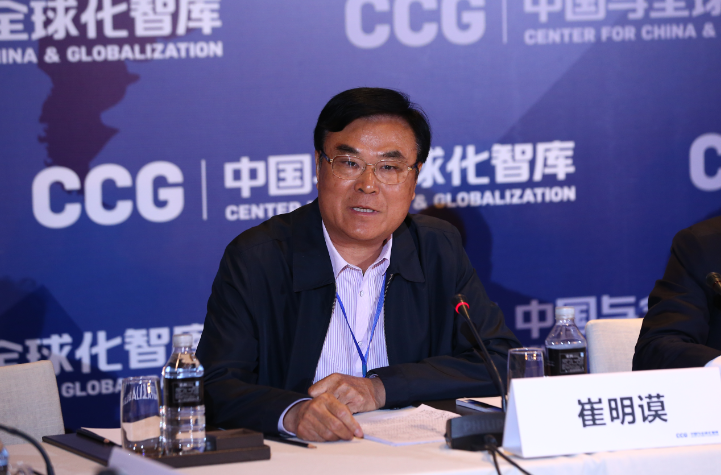
Cui Mingmo pointed out that as Chinese enterprises are expanding their investment overseas, they are facing a new environment where opportunities and challenges co-exist. He suggested that Chinese enterprises actively engage in the One Belt/One Road initiatives and international cooperation on production capacity. They also need to fully leverage the advantages in trade zones, focus on nurturing talent, increase capacity for coping with risks, and localize its business by blending in to the host countries. By doing so, firms can fulfill their social responsibilities, providing new employment and increasing taxation income for the local community.
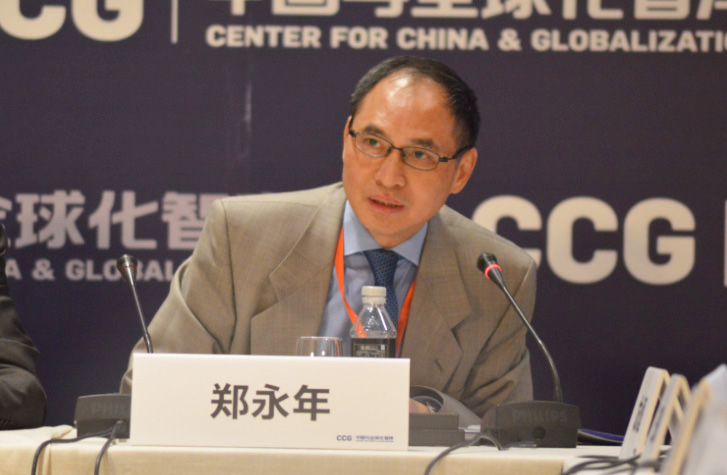
Zheng Yongnian argued that the arising populism on an international scale has triggered a huge challenge for globalization. This emergence in populism was triggered by domestic issues and international conflicts. Solutions to this issue might vary from country to country, due to the political leader’s different perspective. As for China, in order to avoid populism, it needs to reform of its domestic political system and ease the international conflicts in a more open way. That is the responsibility of think tanks, and CCG should continue promote China’s global development.
The Pioneering and Comprehensive Analysis of the Globalization Trends in China
In order to conduct a profound discussion, the forum was subdivided into four discussion topics: G20 and Global Governance and the Development of Chinese Enterprises; Opportunities and Challenges in the Global Development of Chinese Enterprises; New Business and Investment Opportunities Generated by Internet Plus; and New Direction for China’s Industrial Upgrading and Economic Development.
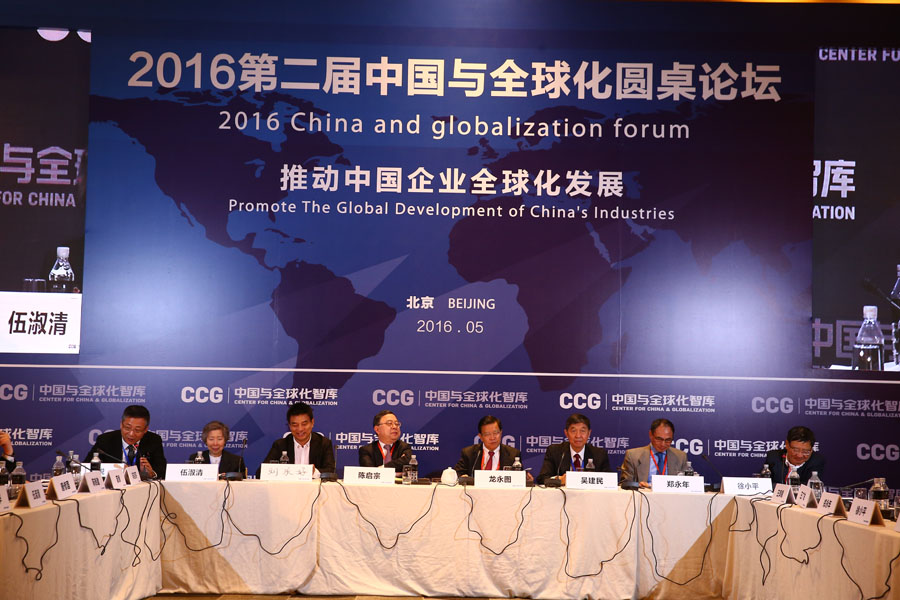
A group of influential people participated in the first panel of the roundtable discussion: Long Yongtu; Ronnie C. Chan; Wu Jianmin, the Former President of Beijing Foreign Affairs University and the Former Chinese Ambassador to France; Xu Xiaoping, the Vice Chairman of CCG and the Founder of ZhenFund; Liu Yonghao, the Vice Chairman of CCG and the Board Chairman of New Hope Group; Wu Shuqing, the Honorary Board Member of World Trade Centers Association and a standing member of the National Committee of the Chinese People’s Political Consultative Conference; and Zheng Yongnian. The first panel, moderated by Yang Rui, a host of CCTV English Channel, focused on G20 and Global Governance and the Development of Chinese Enterprises. Panelists conducted a comprehensive discussion on some of the related current hot topics. These include the following. As the participant, developer and contributor of the current global system, how can China enhance its institutional participation to the global governance by upholding the principle of negotiation, co-construction and sharing. China needs to explore ways to push forward global governance system and capacity modernization while developing itself. What are the ways to promote and elevate the development of WTO system? What are the potential opportunities and challenges China needs to face with the arising multilateral free trade zones such as TPP and RCEP?
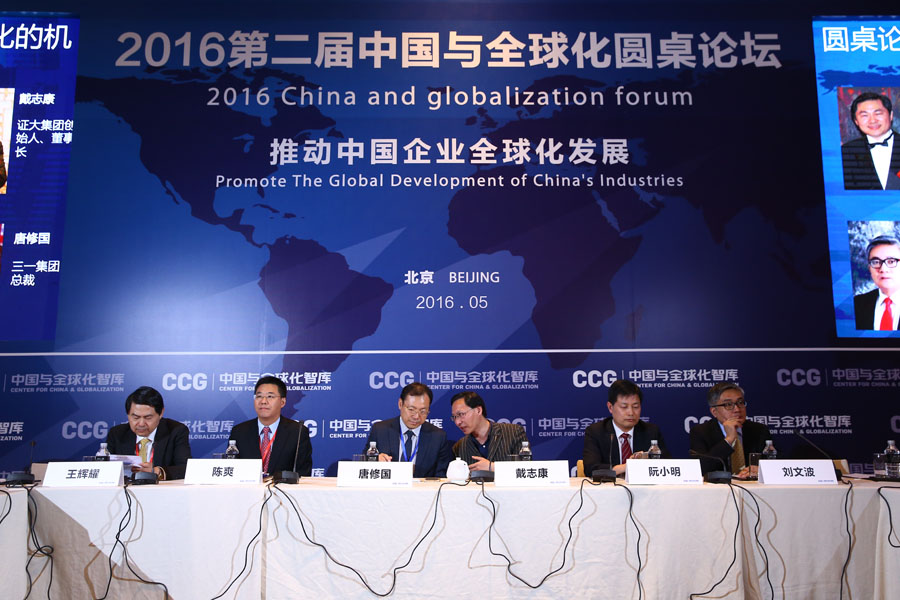
The second panel of the roundtable discussion focused on Opportunities and Challenges for Chinese Outbound Enterprises and was moderated by Wang Huiyao. Panelists included Chen Shuang, CCG standing council member, and Executive Director and CEO of China Everbright Co., Limited; Dai Zhikang, CCG standing council member, Founder and the Board Chairman of Zhengda Group; Tang Xiuguo, CEO of Sany Group; Liu Wenbo, global senior partner of Roland Berger Strategy Consultants; and Ruan Xiaoming, the Board Chairman of GEMSY Co., Limited. As the world second largest economy, China is increasing its global competitiveness. Chinese enterprises are going global, striving to integrate global resources, advance up the high-end of global value chain, promote structural optimization of domestic industries, and push forward the upgrading and synergy of Chinese economy. At the same time, the government has given clear policy guidance and stronger support for the enterprises’ outbound investment. Panelists shared their experience and observations regarding the challenges and countermeasures in the process of globalization.
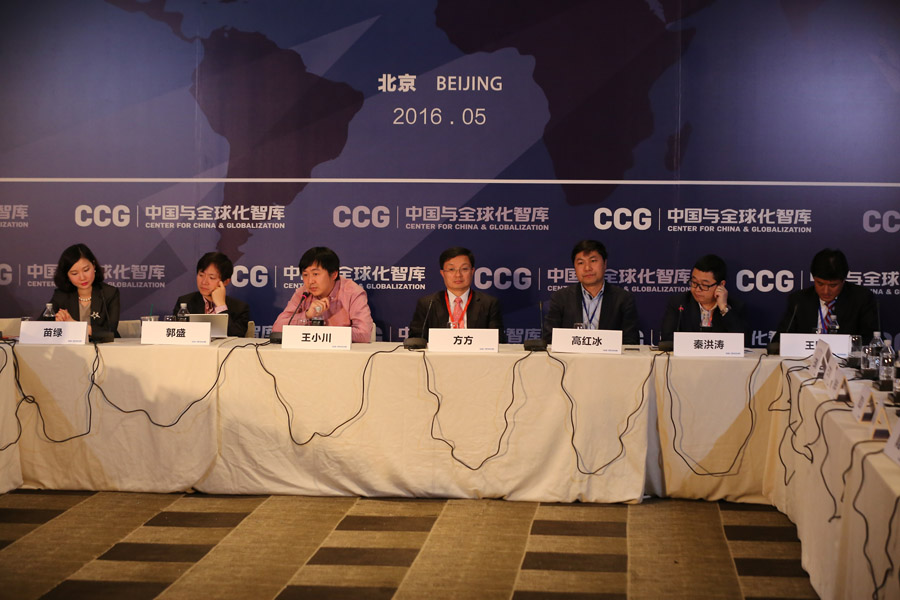
The third panel of the roundtable discussion, focused on New Business and Investment Opportunities Generated by Internet Plus, was moderated by Miao Lu, Secretary-general of CCG and Secretary-general of Professional committee of China international talent. Panelists included Fang Fang, Vice President of CCG, Founder and board Chairman of Waterwood Investment Management Limited; Gao Hongbing, Senior Vice President of Alibaba and President of Ali Institute; Guo Sheng, CCG standing council member, CEO of Zhilian Zhaopin; Qin Hongtao, CCG standing council member, Founder and President of Hengchang Company; Wang Yang, President of Cerberus Investment Group; and Wang Xiaochuan, CEO of Sougou. The panelists had a heated discussion on changing modes of production and business organization brought on by Internet Plus; the evolution of new business mode featuring web-based service and intelligence; and how to make use of the multiplier effect of mass entrepreneurship and innovation and Internet Plus.
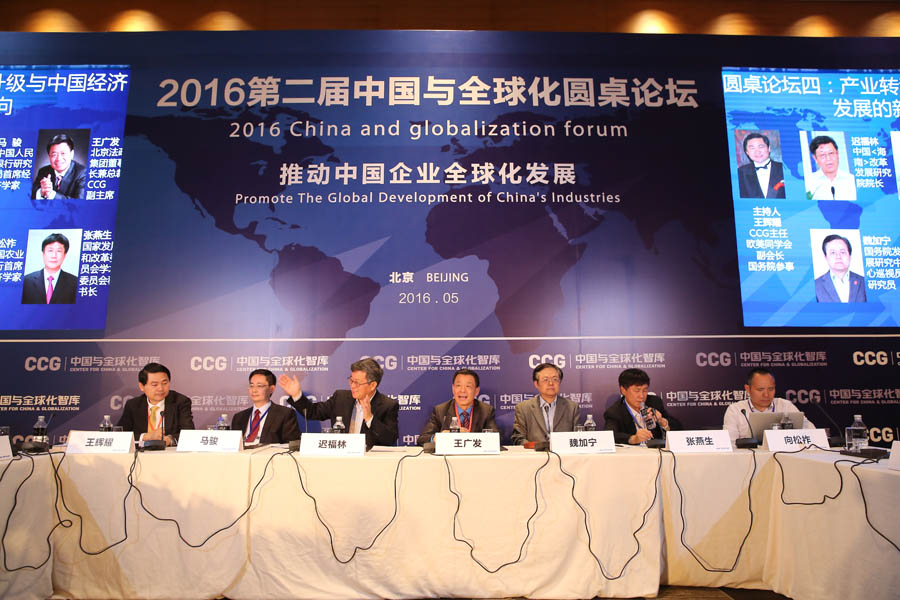
The fourth panel of the roundtable discussion focused on the New Direction for China’s Industrial Upgrading and Economic Development and was moderated by Wang Huiyao. Panelists included Chi Fulin, member of CCG academic expert committee and President of China Reform and Development Institute (Hainan) ; Ma Jun, CCG non-resident senior research fellow and chief economist of People’s Bank of China Research Bureau; Wang Guangfa, Vice President of CCG, the board Chairman and President of Beijing Fazheng Group; Wei Jianing, member of CCG academic expert committee, Director-general of State Council Development and Research Center; Xiang Songzuo, chief economist of the Agriculture Bank of China; Zhang Yansheng, member of CCG academic expert committee, Secretary-general of the academic committee of the National Development and Reform Commission. The panelist conducted in-depth discussions on the goals of the 13th Five Year Plan, solutions to thorny development issues, pushing forward supply side reform, unleashing market forces and innovation across China’s society.
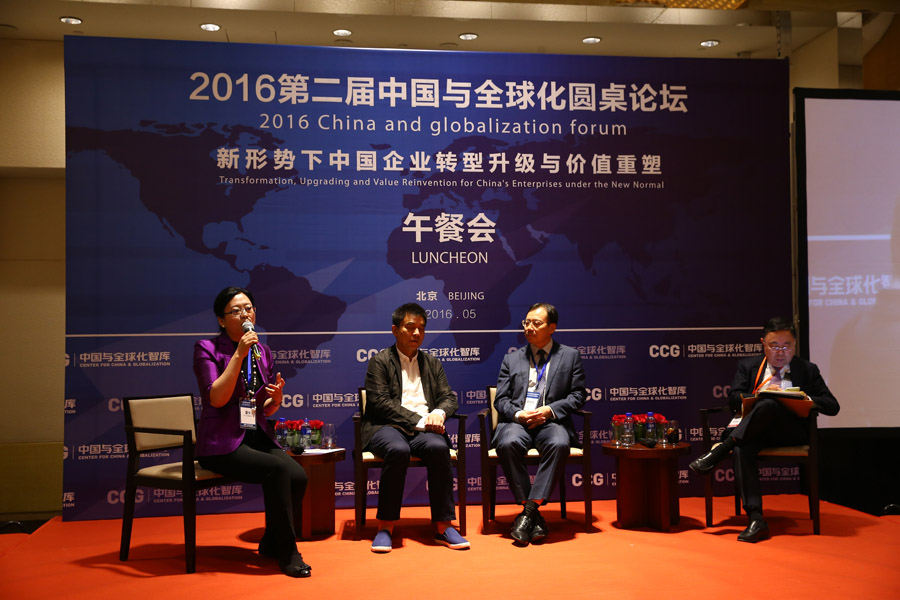
The China and Globalization forum also hosted a luncheon focused on Transformation and Upgrading of Chinese Enterprises and Value Remolding under the New Circumstances. A Dialogue was conducted between Ronnie C. Chan, Liu Yonghao, Tang Xiuguo, and Xia Hua (Board Chairman of the Eve Group). They talked about persistence and innovation in enterprises, industrial extension created by the Internet, and integration of resources and reconstruction of value chain.
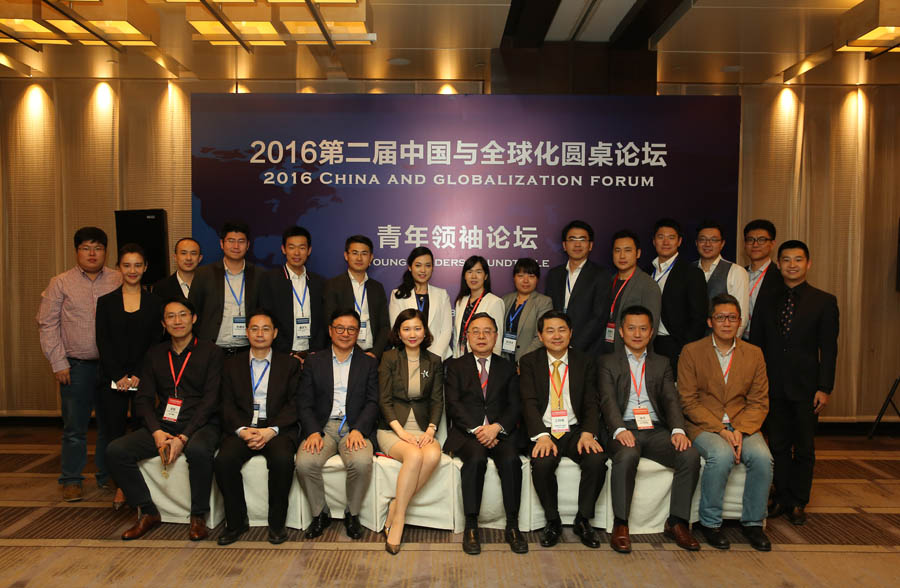
On the evening of May 15th, the forum hosted a special session named as “The Youth Leaders Roundtable Discussion”. Ronnie C. Chan, Wang Huiyao and other leading figures conducted an insightful dialogue with the arising youth leaders on the topic of global trends and responsibilities.
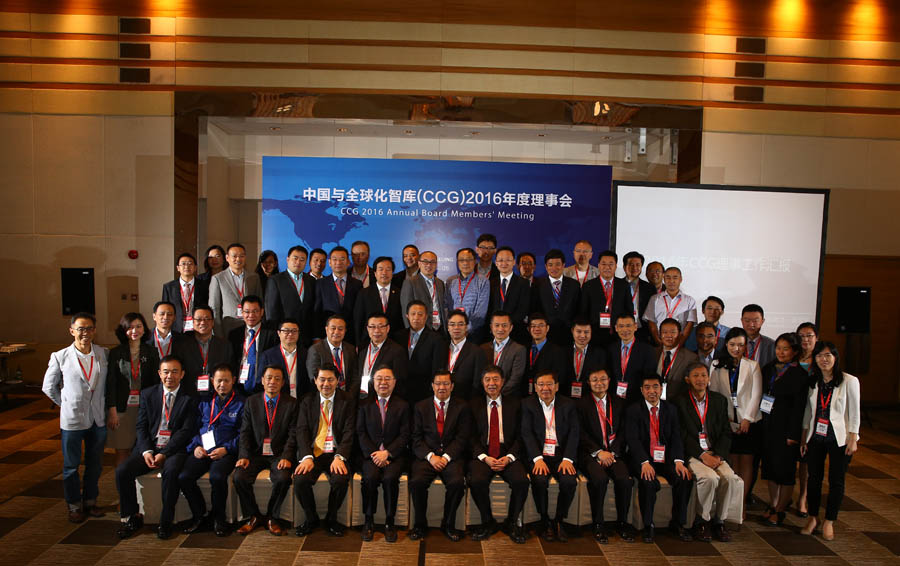
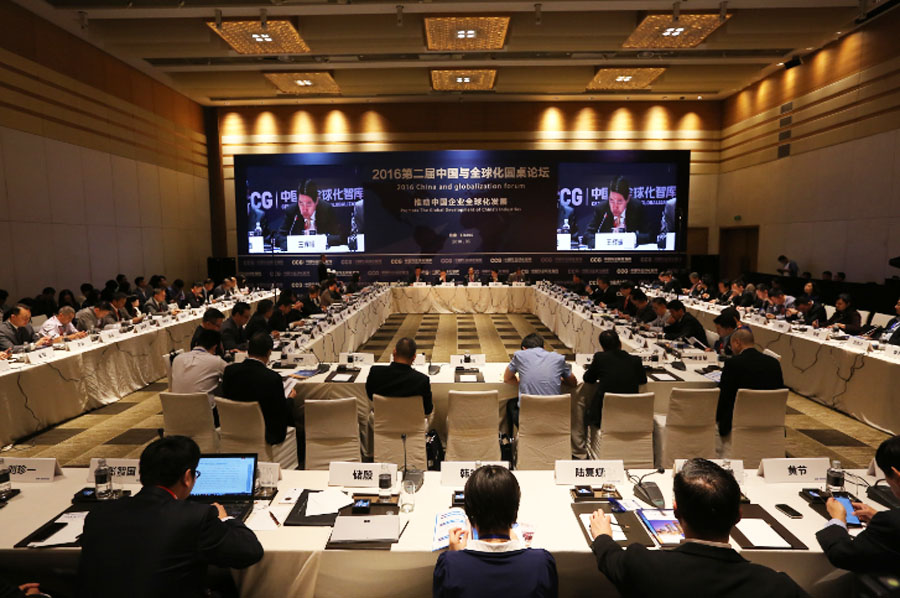
Providing More Constructive Advices for Policy Studies
Wang Huiyao delivered the concluding address at the closing session of the forum. He pointed out a list of crucial challenges confronting China that CCG needs to focus on in the future. These issues include: against the backdrop of rapid globalization, the ongoing economic transformation and the implementation of innovation-driven development strategy, how can we seize the trends and opportunities in the ever-changing global environment in order to better adapt to the new situation? How can China actively participate in the global governance, increasing China’s voices and shaping a new international order? How to leverage the global resources legitimately for developing new advantages in international competition? How to make a better use of the opportunities brought by the One Belt/One Road Initiatives? Wang Huiyao also acknowledged the importance of this event in providing an open platform for the Chinese elites to exchange ideas, conduct in-depth communication, and provide constructive advices on public policy studies.
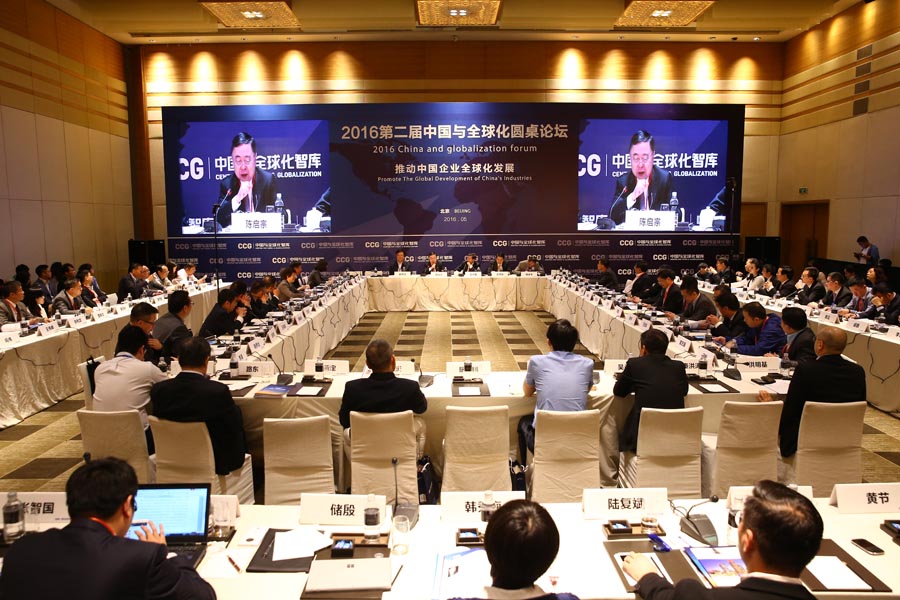
As one of the most active global think tanks in China, CCG organizes a large number of seminars, academic dialogues, roundtable discussions and high-level forums. Through all of these events, CCG has established a professional and efficient platform for exchanging ideas. CCG actively collects opinions and advice from policymakers, academic scholars, its council members, and key business leaders. Through CCG, these valuable opinions provide strong support to public policy studies, which in return enhances the think tank’s social influence. Sticking to the mission of providing an essential reference point for Chinese policymakers from a global perspective, CCG will continue to hold its annual China and Globalization Forum. By inviting government officials, business executives, and academic scholars, CCG strives to establish a long-term conversation on the topic of China’s development strategy and its role in the globalization process. Furthermore, CCG will also integrate the valuable advices into policy advisory reports and submit them to the related government agencies to promote a better policy-decision process.
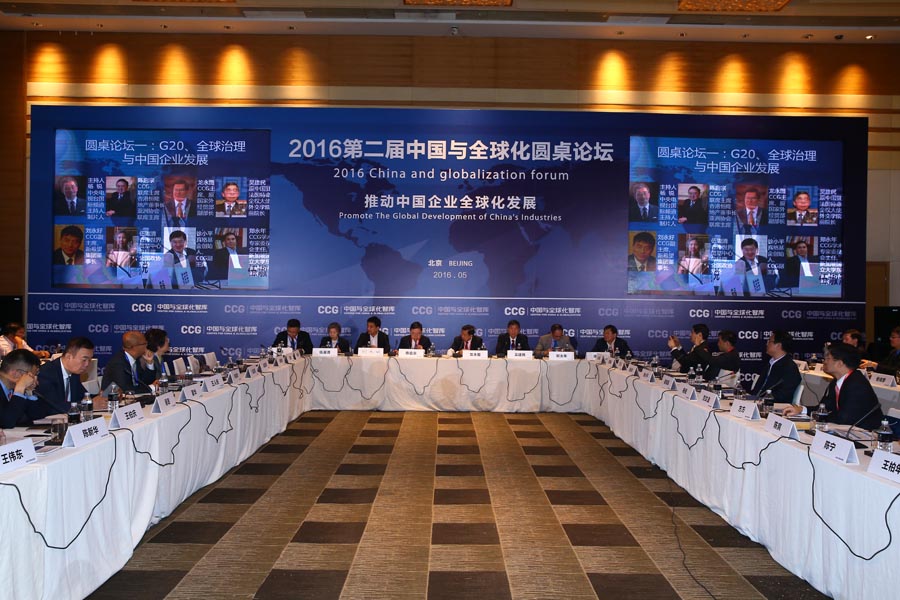
Founded in 2008, Center for China and Globalization (CCG) is a leading Chinese global think tank headquartered in Beijing, with three research institutes in Guangzhou, Qingdao, and Shenzhen/Dongguan. In addition, CCG has also established an agency in Shanghai as well as global representative offices in Hong Kong, New York, Washington D.C., London, Frankfurt, Paris, and Sydney. Dedicated to the study of China and globalization in general as well as the globalization of Chinese talent and enterprises in particular, CCG currently has almost 100 full-time researchers and working staff. According to the 2015 Global Go To Think Tank Index which organized by the Think Tank and Civil Society Program (TTCSP) of University of Pennsylvania, CCG was ranked as 110th of the top think tanks worldwide, and it was included in the world’s top 50 independent think tanks and the top 100 think tanks to watch for in the world. TTCSP also ranked CCG as the 7th think tank in China and the No. 1 non-affiliated think tank among the top Chinese think tanks.






